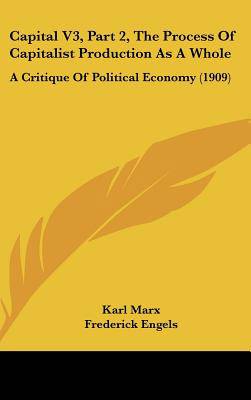
- Afhalen na 1 uur in een winkel met voorraad
- Gratis thuislevering in België vanaf € 30
- Ruim aanbod met 7 miljoen producten
- Afhalen na 1 uur in een winkel met voorraad
- Gratis thuislevering in België vanaf € 30
- Ruim aanbod met 7 miljoen producten
Zoeken
Capital V3, Part 2, The Process Of Capitalist Production As A Whole
A Critique Of Political Economy (1909)
Karl Marx
Hardcover | Engels
€ 65,45
+ 130 punten
Uitvoering
Omschrijving
Capital V3, Part 2, The Process Of Capitalist Production As A Whole: A Critique Of Political Economy (1909) is a book written by Karl Marx. It is the third volume of his famous work, Capital, and is a comprehensive critique of political economy. This particular volume focuses on the process of capitalist production as a whole. The book is divided into three parts. The first part deals with the circulation of capital, including topics such as money, credit, and interest. The second part focuses on the production of surplus value, which is the difference between the value of the goods produced and the cost of producing them. The third part examines the capitalist mode of production in its entirety, including the role of the state, the relationship between the working class and the capitalist class, and the contradictions inherent in the capitalist system.Throughout the book, Marx argues that the capitalist mode of production is inherently exploitative and unsustainable. He critiques the way in which capitalists extract surplus value from workers, and he argues that this process leads to economic crises and social unrest. Marx also provides a detailed analysis of the contradictions within the capitalist system, including the tendency towards overproduction and the concentration of wealth in the hands of a few.Overall, Capital V3, Part 2, The Process Of Capitalist Production As A Whole: A Critique Of Political Economy (1909) is a seminal work of Marxist theory that continues to influence political and economic discourse to this day. It provides a detailed analysis of the workings of the capitalist system and offers a critique of the exploitation and inequality that it perpetuates.This scarce antiquarian book is a facsimile reprint of the old original and may contain some imperfections such as library marks and notations. Because we believe this work is culturally important, we have made it available as part of our commitment for protecting, preserving, and promoting the world's literature in affordable, high quality, modern editions, that are true to their original work.
Specificaties
Betrokkenen
- Auteur(s):
- Uitgeverij:
Inhoud
- Aantal bladzijden:
- 330
- Taal:
- Engels
Eigenschappen
- Productcode (EAN):
- 9781160031233
- Verschijningsdatum:
- 17/02/2010
- Uitvoering:
- Hardcover
- Formaat:
- Genaaid
- Afmetingen:
- 152 mm x 229 mm
- Gewicht:
- 653 g

Alleen bij Standaard Boekhandel
+ 130 punten op je klantenkaart van Standaard Boekhandel
Beoordelingen
We publiceren alleen reviews die voldoen aan de voorwaarden voor reviews. Bekijk onze voorwaarden voor reviews.











